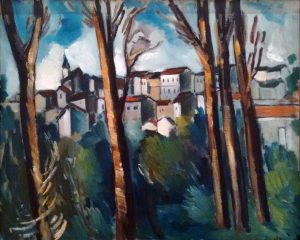 “The Other Town” by Steven Millhauser tells the story of a town which, for some reason, has an exact replica of itself on the other side of the woods. Members of the original town can visit the other town for recreational purposes and can access any part of it, including the inside of any house, which are also exactly the same as their own homes. There is controversy over the other town, as many consider it to be an invasion of privacy that anyone can, at any time, see exactly what is inside their homes (for example, clothes strewn about a bedroom which led to rumors of an affair). However, most still visit and enjoy it. Many become almost obsessed with it, critiquing every tiny detail, such as the pattern of broken glass and the leaves on the trees. The other town was not always as meticulously kept as it is at the time of the story, but people’s close attention to detail has led to the increased accuracy. The other town is paid for by their taxes, after all.
“The Other Town” by Steven Millhauser tells the story of a town which, for some reason, has an exact replica of itself on the other side of the woods. Members of the original town can visit the other town for recreational purposes and can access any part of it, including the inside of any house, which are also exactly the same as their own homes. There is controversy over the other town, as many consider it to be an invasion of privacy that anyone can, at any time, see exactly what is inside their homes (for example, clothes strewn about a bedroom which led to rumors of an affair). However, most still visit and enjoy it. Many become almost obsessed with it, critiquing every tiny detail, such as the pattern of broken glass and the leaves on the trees. The other town was not always as meticulously kept as it is at the time of the story, but people’s close attention to detail has led to the increased accuracy. The other town is paid for by their taxes, after all.
The way that I read it, this story explores themes of the loss of privacy and the breaking down of boundaries. There is debate among the people in the town about the effect that the other town has on their children. Some argue that allowing children to visit the other town disrupts their still-developing understanding of boundaries and encourages “indecent behavior,” citing an incident wherein six children broke into and defaced a home in the original town while the owners were away. Defendants of the other town argue that it is the parents’ fault for “failing to enforce the distinction” between the two towns, and that “childhood disobedience won’t vanish if the other town is abolished.” They also argue that because incidents that severe are rare, they’re not particularly relevant. This argument is very reminiscent of arguments about the type of content children are exposed to through TV, video games, and (most recently) the internet.
There is an element of obsession that runs through the story, which I think is an accurate representation of many people’s reaction to things that push or break boundaries. There is something of this in the idea of internet addiction and parasocial relationships, where individuals will become mildly (or severely) obsessed with people they don’t really know because they have caught a glimpse into their life and become attached. There is an addictive property to feeling like you are privy to something private or secret, even if it is really available for anyone to see (that being either anybody in the town, or anybody on the internet). The story is not a perfect metaphor for the internet—I think it could be applied to a number of different things, such as escapist fiction or even pornography. I think that the internet is a particularly relevant application, so that is the way I read it, but I am interested in other interpretations.
I agree with you interpretation of this story having to do with a loss of privacy, and I think that it also touches on the subject of where does a person draw a line. Also, I also agree with the element of obsession as the towns peoples’ obsession with the other town is what has allowed for it to grow and become such an accurate reflection of their own town.
I like that you pointed out that this story focused partly on invasion of privacy. I hadn’t really thought of that or made that connection while reading. I instead focused on the obsession with keeping the other town exactly the same – allowing that ability to see a refection of oneself.